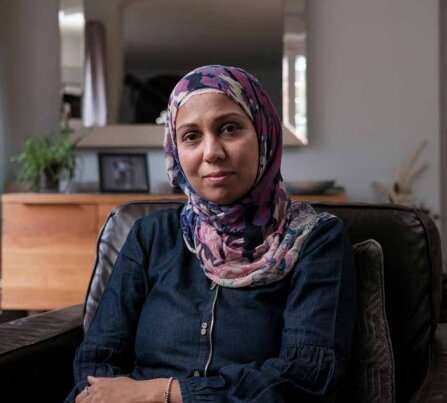This article has been reviewed according to Science X's editorial process and policies. Editors have highlighted the following attributes while ensuring the content's credibility:
fact-checked
trusted source
proofread
Report: British Muslims faced difficulties accessing health care during pandemic

A new report involving UCL researchers has laid bare difficulties British Muslims face when accessing palliative and end of life care.
The report—a study between the Muslim Council of Britain, end of life charity Marie Curie, the University of Leeds and UCL—reveals a "postcode lottery" of care.
It says the COVID-19 pandemic made pre-existing heath inequalities worse, and disproportionately impacted the health of people from most minoritized groups.
Family members in the study described not knowing how to support their loved ones' distressing symptoms, and struggling to get the information and support they needed. The report also found that health care providers need to do more to raise awareness of what palliative and end of life care services are available and can achieve to minoritized groups, including British Muslims.
The report suggests that greater involvement of a diverse range of people in the development of health and social care services is needed to tackle inequity in access to care.
Zara Mohammed, Secretary-General of the Muslim Council of Britain, said, "This report highlights the deep-seated nature of health inequalities and their particular prevalence within British Muslim communities.
"Evidence from Public Health England and the Office for National Statistics revealed that during the peak of the pandemic, minoritized groups had the highest rate of COVID-19 deaths.
"The Muslim Council of Britain also listened and paid heed to health care workers on the front line who warned of the disproportional impact COVID-19 was having on minoritized communities, long before it was acknowledged in mainstream discourse.
"This period of intensive learning has reaffirmed the systemic nature of inequality."
Key to the report was a series of interviews carried out by members of the British Muslim community with other individuals with lived experience of the health system during the COVID-19 pandemic.
Families and patients described difficulties and delays in accessing health care, isolation and restrictions around rituals which negatively impacted their lives and may have sped up the decline of people with palliative care needs.
The shift to online and virtual delivery of care during COVID-19 compounded challenges, with health care providers relying too much on digital solutions which many people struggled to access. This affected both the physical and mental health of people who felt forgotten in the system.
Saad, a 56-year-old Pakistani man whose father had dementia, said before the pandemic, his father received face-to-face consultations, but care fell away during lockdown.
"He didn't trust the phone and the Zoom calls, so I think that was a problem for him. He would go to see the GP, have the GP physically examine him and then give him medication. And I think when that wasn't possible, he probably didn't cope with it right," he said.
With the main focus on COVID-19 during the peaks of the pandemic, many people with other conditions felt their palliative care needs were neglected.
Reema, a 42-year-old Pakistani British woman who has multiple sclerosis, said she had to self-manage the pain she was experiencing during the pandemic because of difficulties accessing health care services.
She said, "When I was seen it was [at] an alarming state. If I had been seen earlier, I wouldn't have been through so much pain. I kept getting in touch with my GP but it wasn't addressed in the right time.
"There were people who were unwell, like myself, for a long period of time, and we needed support. We needed those services, but they just completely neglected everything else, and the focus went to COVID-19. So that has been very disappointing."
Patients also felt unsure about how to access information or support for their care needs, and sometimes struggled to be understood.
Co-author Dr. Gemma Clarke (University of Leeds) said, "British Muslims told us they felt left behind and didn't know where to turn for help during the most difficult times of their lives. Our research highlighted the experiences of an already marginalized group within our society. We want our work to be used to design better services, that properly support the people that need them."
Co-author Dr. Briony Hudson (UCL Psychiatry and Marie Curie) said, "Services must explore and understand the needs of diverse local communities, including British Muslims, to adapt services and make them more accessible. Organizations providing health and social care services must ensure that individuals, and those who are important to them, are placed at the center of decision-making.
"What is also clear from this research is that more support is needed for those who do not have the support of family networks. It is crucial that those who are isolated or otherwise vulnerable have routes into the support that they need."
The report makes a number of recommendations for improving care for minority groups. These include providing culturally appropriate services; better support for family and caregivers of people with palliative care needs; tackling health exclusion through early involvement; and making information more accessible.
More information: Muslim Voices: The palliative care needs of British Muslims during the Covid-19 pandemic and beyond: mcb.org.uk/wp-content/uploads/ … MC_Report_280223.pdf





















